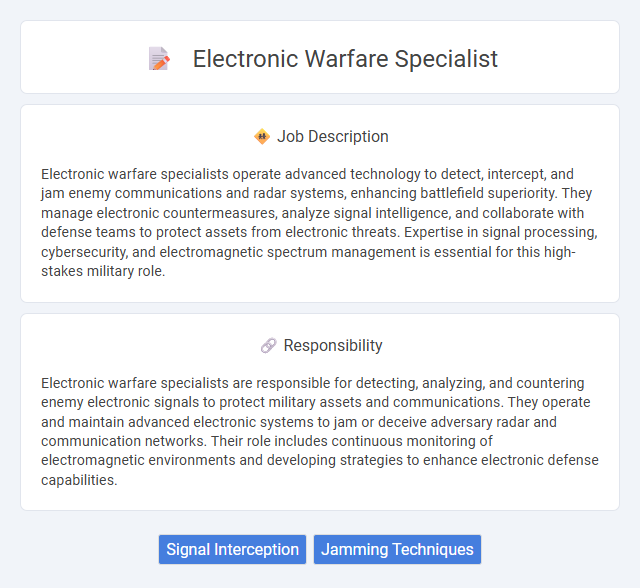
Electronic warfare specialists operate advanced technology to detect, intercept, and jam enemy communications and radar systems, enhancing battlefield superiority. They manage electronic countermeasures, analyze signal intelligence, and collaborate with defense teams to protect assets from electronic threats. Expertise in signal processing, cybersecurity, and electromagnetic spectrum management is essential for this high-stakes military role.
Individuals with strong analytical skills and the ability to remain calm under pressure are likely suitable for an electronic warfare specialist role, as the job demands quick decision-making in high-stress environments. Those who are adaptable, detail-oriented, and possess a solid understanding of technology and cybersecurity may find a good fit in this field. People prone to anxiety or with difficulty managing stress might face challenges in maintaining performance and focus during critical operations.
Qualification
Electronic warfare specialists require a strong foundation in signal processing, radio frequency (RF) systems, and cyber defense techniques. Proficiency in military communication protocols, experience with electronic support measures (ESM), and knowledge of radar and jamming equipment are essential. A degree in electrical engineering, computer science, or a related field combined with security clearance and hands-on training in tactical electronic warfare systems enhances qualification.
Responsibility
Electronic warfare specialists are responsible for detecting, analyzing, and countering enemy electronic signals to protect military assets and communications. They operate and maintain advanced electronic systems to jam or deceive adversary radar and communication networks. Their role includes continuous monitoring of electromagnetic environments and developing strategies to enhance electronic defense capabilities.
Benefit
An electronic warfare specialist likely gains valuable expertise in advanced technology and signal analysis, enhancing career prospects in both military and civilian sectors. The role probably offers opportunities for high job security and competitive compensation due to specialized skills in defense systems. Exposure to cutting-edge electronic systems may also provide continuous professional development and potential advancement within the field.
Challenge
Electronic warfare specialists likely face complex and evolving challenges in detecting, analyzing, and countering sophisticated enemy electronic systems. The role probably demands rapid adaptation to new technologies and unpredictable threat environments, requiring continuous learning and strategic thinking. Success in this field may depend on maintaining sharp analytical skills and staying ahead in electronic intelligence and countermeasure techniques.
Career Advancement
Electronic warfare specialists advance their careers by gaining expertise in radar, signal intelligence, and cyber defense systems, essential for modern military and defense operations. Progression often involves certifications in electronic countermeasures, leading to roles such as electronic warfare officer or defense technology analyst. Mastery of advanced software-defined radio technologies and continuous training in cyber-electronic attack techniques enhances opportunities for higher-level strategic positions.
Key Terms
Signal Interception
Electronic warfare specialists in signal interception focus on detecting, capturing, and analyzing enemy communications and radar signals to gain tactical advantages. They utilize advanced radio frequency (RF) technologies and sophisticated software to monitor electromagnetic spectra, identifying threats or hidden transmissions. Expertise in signal processing and electronic intelligence (ELINT) enables these specialists to disrupt adversary operations while protecting friendly forces.
Jamming Techniques
Electronic warfare specialists employ advanced jamming techniques to disrupt enemy radar, communication systems, and missile guidance. These techniques include barrage jamming, spot jamming, and sweep jamming, each targeting specific frequencies to degrade adversary signal reliability. Mastery of electronic attack methods ensures tactical advantage by denying the enemy effective use of the electromagnetic spectrum.
 kuljobs.com
kuljobs.com